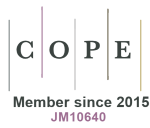Guidelines for reviewers
Peer-review and Editorial policy | Conflicts of Interests | Performing your review | Submitting your comments
Peer-review and Editorial policy
All submissions to Journal of Circulating Biomarkers (JCB) are initially screened by the Editorial Office who performs a technical check based on the manuscript being a) complete in all its parts and b) not present potentially plagiarized contents. All manuscripts submitted to the Journal are screened using iThenticate by CrossCheck.
Editor assignment
All suitable submissions are then assigned to the Editor in Chief or Section Editor who will perform an editorial screening to evaluate manuscript which are a) suitable for the section, b) with a sound author background and c) presenting topics of relevance to the journal’s readership. If it is not deemed appropriate it will be rejected immediately. The Editor in Chief or Section Editor will be in charge of selecting and inviting reviewers, evaluating their comments and submitting an editorial recommendation.
Editorial decision
The Editor in Chief will finalize the decision and will inform the authors. The final decision is based on the adequacy of comments supplied by the selected reviewers, the replies supplied by the authors in their revisions and the overall quality of the manuscript. The Editor in Chief can select from accept, reject, ask for revisions or invite additional reviewer(s).
Revisions
Should a revision be recommended, we ask authors to return their revised submission with a point-by-point reply within 2 to 4 weeks. Depending on the extent of changes suggested and how the authors have improved their manuscript, a second round of review may be required.
Peer-review
Journal of Circulating Biomarkers adopts a single anonymized peer-review process, which means that reviewer identity is not made visible to authors, author identity is visible to reviewers, reviewer and author identity are visible to the editors. Reviewers are asked to supply confidential comments and recommendations, which will only be visible to the Section Editor and Editor in Chief, and comments for the authors which are shared in an anonymous way. We invite both external reviewers and members of the Editorial Board, and allow reviewers suggested by authors, although their invitation is decided by the Editors. We allow 7 days for them to agree or decline to perform the review, asking to return their comments within 2 to 4 weeks from accepting the review assignment. Reviewer reports are confidential and are not posted with the articles. Editorials and correspondence may be reviewed and accepted by Editor’s decision. No information about the review process or editorial decision process is published.
Peer review details:
identity transparency: single anonymized
Reviewer interacts with: Editor in Chief and Associate Editors
Review information published: none
Potential Conflicts of Interests
Please inform the editor promptly if you believe there is conflict of interest between your work and the manuscript you are being asked to review.If there is a conflict of interest this does not exclude you entirely form reviewing a certain manuscript, but you should make sure to disclose any potential conflict to the Editor.
Initial considerations
You should always conduct your review objectively. Direct personal criticism is not appropriate and your views should always be supported by clear argumentations. Your comments should always be polite and constructive.
Upon being asked to review you should consider three basic points prior to accepting to review:
- does the topic fit in your personal area of expertise? Only accept an invitation to review if you are competent to review the topic presented
- can you dedicate time for reviewing the article within the set timeframe?
- Can you foresee conflict of interest between your work and that of the authors you should be reviewing?
Reviewing a manuscript must always be treated with confidentiality. You should not disclose or discuss the manuscript with colleagues. If you feel a paper is really unacceptable be brief, but offer a few constructive comments and criticisms.
When performing your review, consider the following points as a guidance:
- Does the title describe the article?
- Is the sample size adequate?
- Does the article support or contradict previous theories?
- Prospective is better than retrospective. Larger sample sizes are better than smaller. Longer follow up is better than shorter.
- For all papers, it is important to explain inclusion and exclusion criteria.
- Is there IRB approval? Are there other ethical or regulatory issues? Conflict of interest issues?
- Is the content in correct sections of the manuscript? So, are discussion comments in the results section or are methods and results comments mixed up?
- Are tables and figures as clear as they can be? Are they all needed? Material should not be duplicated. If the authors give data in a table, it need not be reiterated in the text or vice versa.
- References should include pertinent material and need not be encyclopedic. Did the authors select the appropriate material to cite?
Ethical issues
Plagiarism: if you suspect that an article is a substantial copy of another work,please let the editor know, citing the previous work in as much details as possible.
Fraud: it is very difficult to detect the determined fraudster, but if you suspect the results in an article to be untrue, discuss it with the editor;
Other ethical concerns: for medical research, has confidentiality been maintained? Has there been a violation of the accepted norms in the ethical treatment of animal or human subjets? If so, then these should also be identified with the Editor.
Be polite with the authors. Always remember that your comments will help authors to improve their skills and expertise: even if you think a paper should be rejected, your comments will help the authors to improve their next efforts. Spend some time to offer constructive criticisms and please be polite with your comments; consider how you would feel reading the criticism as an author.
Grammar and language issues
Many authors are writing in a second language. The writing must be excellent when the paper is finalized, but we can review papers with poor writing as long as the science is understandable. All accepted papers are subject to a thorough language editing.
Submitting your comments
Once you have completed your evaluation of the manuscript, you canproceed with submitting your comments to the Editor. If you might be delayed, do let the Editor know and arrange for a deadline extension.The review form is structured inthree separate areas:
A) The manuscript rating card, based on the following criteria:
80–100: Excellent. Decision is accept as is or with minor changes. Only few manuscripts can be included in this rating.
60–79: Above average manuscript. Decision is usually accept with minor changes with a really moderate revision
40–59: Average manuscript.Most of these manuscripts may be accepted or can be rejected depending on space
20–39: Below average manuscript. Most likely to be rejected, unless a high priority topic that can be improved after one or more revisions
1–19: Unacceptable manuscript. Most likely to be rejected, unless a high priority topic that can be improved after one or more revisions
B) Text boxes to enter comments to the authors and confidential comments to the Editor
C) An area where you can upload a file you maylike to share with authors
D) A drop down menu for your recommendation






